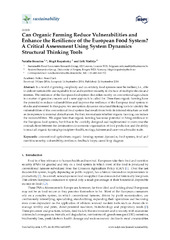Can organic farming reduce vulnerabilities and enhance the resilience of the European food system? A critical assessment using system dynamics structural thinking tools
Peer reviewed, Journal article
Published version

Åpne
Permanent lenke
https://hdl.handle.net/1956/16862Utgivelsesdato
2016-09-24Metadata
Vis full innførselSamlinger
- Department of Geography [676]
Originalversjon
https://doi.org/10.3390/su8100971Sammendrag
In a world of growing complexity and uncertainty, food systems must be resilient, i.e., able to deliver sustainable and equitable food and nutrition security in the face of multiple shocks and stresses. The resilience of the European food system that relies mostly on conventional agriculture is a matter of genuine concern and a new approach is called for. Does then organic farming have the potential to reduce vulnerabilities and improve the resilience of the European food system to shocks and stresses? In this paper, we use system dynamics structural thinking tools to identify the vulnerabilities of the conventional food system that result from both its internal structure as well as its exposure to external disturbances. Further, we evaluate whether organic farming can reduce the vulnerabilities. We argue here that organic farming has some potential to bring resilience to the European food system, but it has to be carefully designed and implemented to overcome the contradictions between the dominant socio-economic organization of food production and the ability to enact all organic farming’s principles—health, ecology, fairness and care—on a broader scale.
